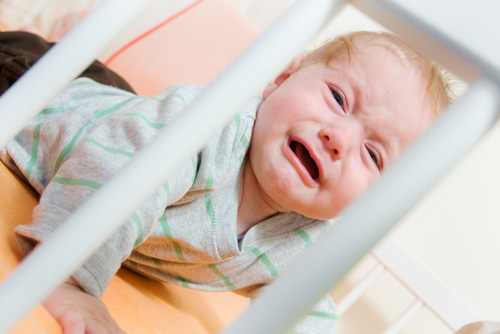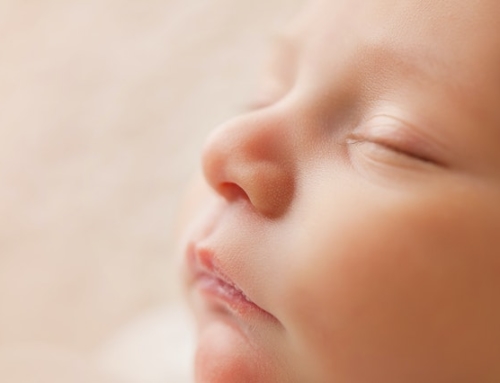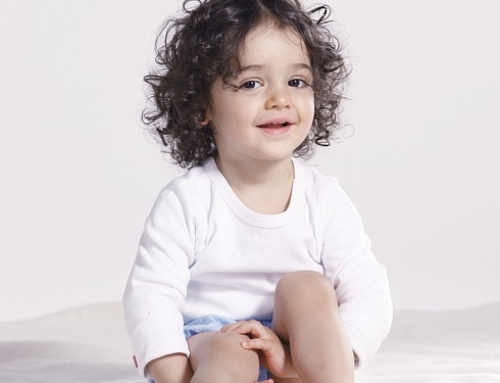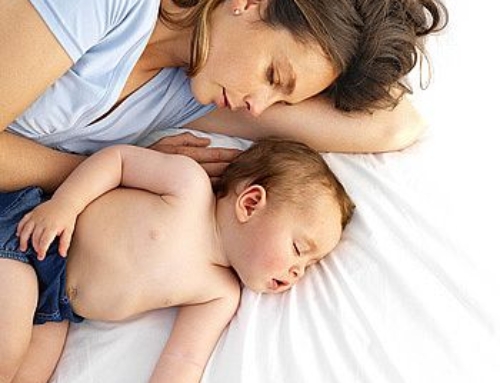
Source: Unknown
If you’re in the business, as I am, of having to talk to a lot of people about sleep training and what it entails or simply live in a Western culture and have heard of people talking about sleep training non-stop, you have likely heard many of the claims and statements about sleep training that are made. There tend to be five different areas that get covered by these claims: quality and quantity of infant sleep, maternal mental health, infant cognition and learning, positive effects of stress, and the development of self-soothing. In this article, I hope to cover each of them briefly (I have gone into more depth in other articles on here which I will also link to) and what the science actually tells us about each.
Quality and Quantity of Infant Sleep
Sleep training improves infant sleep, yes? Children – once sleep trained – sleep longer and better and are happier for it, right?
Wrong.
Yes, parents wake less and report less wakings (though in the long-term when compared to controls even this is questionable
- In one study which provided guidance towards self-settling, with sessions both prenatally and at 3 weeks postpartum, results using actigraphy found no significant difference on sleep outcomes at 6 months of age between the intervention group and the control group[2].
- In a review of the literature on sleep training prior to 6 months of age, it was found that it was completely ineffective at reducing reported infant sleep problems[3].
- In two studies that compared the effectiveness of controlled crying on infant sleep outcomes, neither found any improvement in infant sleep at all compared to the control groups; that is, infant sleep remained exactly the same with or without sleep training. What did change was their signaling to their parents which led to differences in parental report of sleep[4][5].
- In a longer-term follow-up study of a randomized controlled trial involving sleep training, there were no differences between the intervention group and the control group at ages 3 to 4 on their child’s sleep[6].
You can read a fuller discussion here.
Maternal Mental Health
Many people voice concerns over mom’s mental health and the need for sleep. It is believed that if moms sleep better, they won’t be as likely to suffer from post-partum depression so some of the push to sleep train comes from a somewhat well-meaning spot. However, the problem here is that the research isn’t quite as clear in supporting this.
- The same study discussed above that looked at an intervention pushing self-settling prenatally and at 3 weeks postpartum found no group differences at all in terms of parental sleep, fatigue, and parental symptoms of depression[2].
- Though not specifically focused on sleep training per se, one study examined the impact of consolidated infant sleep on maternal well-being which is, after all, the reason given for sleep training for maternal mental health reasons. This research – which examined infants at 6 and 12 months of age and a criteria of 6 or 8 hours of uninterrupted sleep – found no impact on maternal mood at all[7] and the authors concluded that the push to provide behavioural interventions (sleep training) was not supported by the research on maternal mood.
- In the same review on sleep training prior to 6 months, it was found that sleep training actually increased parental anxiety as opposed to decreasing it[3].
- In the 3-year longitudinal study, mothers who had been part of a sleep training intervention were no more likely to suffer depression 3 years on than those who had been in the control group[6].
- In another longitudinal study using sleep training to alleviate depression, there was a significant improvement in depression in the sleep training group at two months post-intervention, but this had disappeared by four months post-intervention which was driven not by larger gains in the control group, but by regressions in improvements in the intervention group coupled with improvements in the control group[8].
Now, it would be remiss of me to ignore the studies that do find that women who are depressed are more likely to report infant sleep problems (e.g., [9], [10]). There are such studies and one of the bigger problems with them (as identified in [3]) is that they don’t suggest causation. These analyses are often structured such that women with depression report more sleep problems than women without, but this doesn’t actually speak to the experience of sleep or what causes what. It is quite possible that depression impacts sleep independently of any infant sleep issues, as is known to happen in adults who suffer depression without children. Indeed, [10] supports this hypothesis when they find that regardless of infant sleep problems, maternal report of her own sleep is a stronger link to depression.
One area I want to note here is that infant sleep has not changed from a biological perspective; however, our culture has. Post-partum depression has not been something that is widespread due to infant sleep but may indeed be another example of what has been terms an evolutionary mismatch. That is, infants expect to wake and nurse and co-sleep, but in our society these are not deemed good behaviours (indeed, in many of the studies above – especially [6],[8],and[10] – these are actually the criteria for an infant sleep problem, not a subjective report from the mother) and thus are frowned upon. However, they exist for a reason and the lack of support that many families face when parenting in a biological or evolutionary manner can create problems where there otherwise might not have been any.
Infant/Toddler Cognition and Learning
Sleep helps learning, right? We know that if we nap after learning something, we do better at remembering it. This knowledge has led to a lot of panic amongst parents who have babies and toddlers who are entirely biologically normal and wake at night. Somehow we have confused the reality of sleep and learning with a belief in a needed long period of sleep in young childhood. We need to set this right, so let us review what we know about sleep and infant cognition and learning.
- In a review of what we know about the link between sleep and cognition in the first year of life, the authors report that we have insufficient evidence to suggest a causal role between sleep and cognitive development, particularly consolidated sleep[11]. That is, when we look at the studies as a whole, there’s nothing to suggest greater sleep leads to greater cognition. In fact, when longitudinal studies were examined (allowing for interindividual variability), the following was found:
- Contrary to the myth, one study looking at sleep in postanatal days 1 and 2 and cognition at age 6 months found that longer sleep durations and fewer sleep-wake transitions were indicative of lower developmental scores at 6 months. They hypothesized that it was due to the fact that longer bouts of sleep in infants are actually suggestive of greater stress and this has impacts on neurocognitive development (linking to below)[12].
- In premature infants, higher cognitive scores at 6 months were related to lower sleep percentages, decreased nighttime sleep percentages, and increased nighttime activity at 36 weeks conceptual age[13].
- Adding to the confusion, one study found that the relationships between sleep rhythm patterns and cognition flipped during the first six months of life[14].
- More studies also found this reverse finding with early sleep and later motor development which is covered in the review. Please view the review for more.
- When compared to infants at 6- and 12-months of age who are sleeping consolidated stretches (parent-report) of 6 or 8 hours at night, children who aren’t doing those stretches show no difference in either psychomotor development or cognitive development, concurrently or later, at 36 months of age[7].
- Another study found modest relationships between greater night wakings and improved cognitive outcomes and no relationships between consolidated sleep and other social-emotional outcomes[15].
Now, again, I have to point out that there are studies that have found relationships between more consolidated sleep and cognitive performance. One of the more interesting notes is that studies that have found sleep to be important are less likely to be longitudinal in nature and based on one time point assessment. It is also quite likely that given the number of variables that can impact cognition, sleep is just one that may or may not have a modest effect based on what is happening with the other variables. However, the consensus right now in the literature is that sleep simply doesn’t seem to impact infant development on a larger level (e.g. [16]).
The Positive Effects of Stress
The common claim here is that the stress of sleep training is actually not great and not only that, but a bit of stress is actually beneficial for us humans. Thus, we can see that leaving a baby to cry at night is helping them.
Not so.
Here is a brief summary of the research, though I link a full piece below that has tackled this misconception in far greater detail than I will go into here:
- An infant’s brain is developing rapidly and has some biological protections from the effects of stress likely because of the negative impact on development. These protections take the form of what has been termed ‘hyporesponsivity’ which is that infants and toddlers do not always show the same physiological stress response when outwardly upset (a behavioural-physiological mismatch). The caveat? The seems to only be activated when infants and toddlers experience minor-moderate stressors and are being comforted by a responsive caregiver[17][18].
- Even minor stressors – when repeated – can cause what is called a ‘kindling effect’ which results in heightened stress sensitivity[19].
- We have no idea when or how trauma occurs in the brain. What we do know is that events that may seem fine for some can cause lasting trauma if they occur at a specific vulnerable period, even when they occur in an otherwise loving context. For example, Dr. Bruce Perry highlights the case of a very traumatized young toddler who experienced neglect by his babysitter. She arrived in the morning and would leave him in his crib for the 8 hours she watched him, refusing to get him. His parents were loving and caring the rest of the time and responsive to him, but this type of neglect led to a strong experience of trauma[20].
- Temperament plays a crucial role in how children experience stress and there are some kids for whom the stress of sleep training could be particularly problematic[17], but you may not know that you’re child until it’s too late. More evidence of the role of temperament in disrupted sleep can also be found in [11].
You can read the fuller piece here.
You may also be interested in reading the following:
The Development of Self-Soothing
One of the more prevailing views out there is that if you don’t sleep train your child, they will lack certain emotion regulation skills.
- Children learn emotion regulation skills (aka self-soothing) from it first being modeled by adults and then being able to call upon adults when they require assistance. Prior to a year, the use of these skills outside of searching for an adult’s help is truly minimal and even by toddler years it’s still a rarity[21][22].
- The more distressed we are, the less able we are to draw upon the few emotion regulation skills we have, which means a distressed infant or toddler simply can’t call upon these skills and the cessation of crying likely has nothing to do with self-soothing, but simply saving energy[23][24].
- Areas of the brain most associated with impacts of early stress are also those associated with social and emotional processing[25]. Thus if we accept that sleep training is at all stressful (which given the evidence above, we should), then the risks are going to be greatest on the development of emotion regulation and they will be negative.
You can read more on this here:
Conclusion
Hopefully by now you can fully understand why many of the things being said about sleep training falls under the category of ‘myth’. These are not facts, they are not supported by science as a whole, and they certainly fly in the face of evolutionary biology and anthropology. Understanding that these are cultural beliefs should help in feeling more confident in your own responses and responsivity to your children.
References
[1] Information sheet from the Baby Sleep Information Source at Durham University, found here: [2] Galland BC, Sayers RM, Cameron SL, Gray AR, Heath ALM, …, Taylor RW. Anticipatory guidance to prevent infant sleep problems within a randomized controlled trial: infant, maternal and partner outcomes at 6 months of age. BMJ Open 2017; 7: e014908. [3] Douglas PS, Hill PS. Behavioral sleep interventions in the first six months of life do not improve outcomes for mothers or infants: a systematic review. J Dev Behav Pediatr 2013; 34: 497-507. [4] Gradisar M, Jackson K, Spurrier NJ, Gibson J, Whitham J, et al. Behavioral interventions for infant sleep problems: a randomized controlled trial. Pediatrics 2016; 137: e20151486. [5] Hall WA, Hutton E, Brant RF, Collet JP, Gregg K, et al. A randomized controlled trial of an intervention for infants’ behavioral sleep problems. BMC Pediatrics 2015; 15: 181. [6] Lam P, Hiscock H, Wake M. Outcomes of infant sleep problems: a longitudinal study of sleep, behavior, and maternal well-being. Pediatrics 2003; 111; e203. [7] Pennestri MH, Laganière C, Bouvette-Turcot AA, Pokhvisneva I, Steiner M, Meaney MJ, Gaudreau H. Uninterrupted infant sleep, development, and maternal mood. Pediatrics 2018; in press; doi: 10.1542/peds.2017-4330. [8] Hiscock H, Wake M. Randomized controlled trial of behavioural infant sleep intervention to improve infant sleep and maternal mood. BMJ 2002; 324: 1062. [9] Dennis C, Ross L. Relationships among infant sleep patterns, maternal fatigue, and development of depressive symptomology. Birth 2005; 32: 3. [10] Hiscock H, Wake M. Infant sleep problems and postnatal depression: a community-based study. Pediatrics 2001; 107: 1317-1322. [11] Ednick M, Cohen AP, McPhail GL, Beebe D, Simakajornboon N, Amin RS. A review of the effects of sleep during the first year of life on cognitive, psychomotor, and temperament development. Sleep 2009; 32: 1449-1458. [12] Freudigman KA, Thoman EB. Infant sleep during the first postnatal day: an opportunity for assessment of vulnerability. Pediatrics 1993; 92: 373–79. [13] Gertner S, Greenbaum CW, Sadeh A, Dolfin Z, Sirota L, Ben-Nun Y. Sleep-wake patterns in preterm infants and 6 month’s home environment: implications for early cognitive development. Early Hum Dev 2002; 68: 93–102. [14] Borghese IF, Minard KL, Thoman EB. Sleep rhythmicity in premature infants: implications for developmental status. Sleep 1995; 18: 523–30. [15] Mindell JA, Leichman ES, DuMond C, Sadeh A. Sleep and social-emotional development in infants and toddlers. J Clin Child Adolesc Psychol 2017; 46: 236–246 [16] Mindell JA, Moore M. Does sleep matter? Impact on development and functioning in infants. Pediatrics 2018; in press; doi: 10.1542/peds.2018-2589 [17] Gunnar Gunnar MR, Donzella B. Social regulation of the cortisol levels in early human development. Psychoneuroendocrinology 2002; 27: 199-220. [18] Gunnar MR. Social regulation of stress in early childhood. In K. McCartney & D. Phillips (Eds.),Blackwell Handbook of Early Childhood Development (pp. 106-125). Malden: Blackwell Publishing, 2006. [19] Monroe SM, Harkness KL. Life stress, the “kindling” hypothesis and the recurrence of depression: Considerations from a life-stress perspective. Psychological Review 2005; 112: 417-45. [20] Perry B, Szalavitz M. The Boy Who Was Raised As A Dog: And Other Stories from a Child Psychiatrist’s Notebook—What Traumatized Children Can Teach Us About Loss, Love, and Healing. Basic Books, 2017. [21] Campos JT, Frankel CB, Camras L. On the nature of emotion regulation. Child Development 2004; 75: 377-94. [22] Rothbart MK, Ziaie H, & O’Boyle CG. Self-regulation and emotion in infancy. In N. Eisenberg & R.A. Fabes (Eds.) Emotion and its regulation in early development: New directions for child development, No. 55: The Jossey-Bass education series (1992) (pp. 7-23). San Francisco: Jossey-Bass Publishers. [23] Stifler CA, Braungart JM. The regulation of negative reactivity: Function and development. Developmental Psychology 1995; 38: 448-55. [24] Kopp C. Regulation of distress and negative emotions: a developmental perspective. Developmental Psychology 1989; 25: 343-54. [25] Hanson JL, Nacewicz BM, Sutterer MJ, Cayo AA, Schaefer SM, et al. Behavior problems after early life stress: contributions of the hippocampus and amygdala. Biological Psychiatry 2014; DOI: 10.1016/j.biopsych.2014.04.020





Thank you again for offering a metered analysis of these issues. Just last week my husband saw a sleep training segment on ‘CBS This Morning’ reporting that some NYC families are spending up to $7,500 for sleep trainers. I often share your writing and resources to others as a counterpoint to their frustrated adherence to western sleep conventions. I appreciate all the work you do and your dedication to keeping parents fully informed.
Thank you! And WOW – it’s really awful sometimes how much people are making on the backs of babies 🙁
[…] mad … and it’s true … there is plenty to be mad about! I”m mad that so much misinformation about child development persists and I’m mad that so many people still casually disrespect children and it even makes me a […]
Is it bad not to co sleep if you’re baby sleeps well by themselves? My 2 month old will often go down by himself without a problem. (Usually i have already nursed him to sleep and held him for 30-60 minutes before I put him down.) He doesn’t usually cry when I put him down, and he will sleep long stretches. Even though he isn’t distressed, could it be emotionally harmful to him if he isn’t in the bed with me. I always go to him and hold and nurse him when he wakes up and I keep his crib right by my bed. Thank you!
If he’s happy and sleeping, no problem 🙂
[…] night wakings, ranging from 4-6 times (usual) to over 10 times a night sometimes. We refuse to sleep train and we know that sleeping through the night is a developmental milestone that she’ll hit at […]
Hi Tracy, thanks for your website! What do you think of the Flinders study that everyone is now using to show that sleep training has no negative impact? Obviously their cortisol measures are inadequate and the benefits of sleep training that they report are minimal and it is too short-term to conclude that there are no negative impacts. However, does it change your opinion on any type of sleep training at all?
Also, what do you think of this site https://scienceofmom.com/2016/02/17/my-sleep-mantra-and-babyms-sleep-story/ and the literature she quotes here: https://www.janetlansbury.com/2016/02/4-eye-opening-things-science-tells-us-about-infant-sleep-guest-post-by-alice-callahan-phd/ ? She talks about studies that show that “gentle” sleep training leads to more emotional regulation. I haven’t yet read the studies themselves as I am in the middle of a sleep-deprivation crisis, where my 5month old suddenly went from sleeping for 5-7 hr stretches to waking up to nurse every hour! — so I was curious what you thought of the literature she is using to create her argument for more “independent” sleep… Although I dismissed the sleep training stuff as total BS, these RIE sites have made me question my approach. Perhaps I overlooked some of the evidence?
I’ve written on that particular study and it shows nothing really. The sample sizes were far too small and they based their results on the null result (lack of difference) which they had to have because their sample was so small, it wouldn’t even detect strong effects, like language learning!
I have seen no studies that find sleep training leads to more emotion regulation. There are studies that talk about lack of crying, etc. but this isn’t emotion regulation. Having reviewed tons of the science, there just isn’t anything that speaks to it being beneficial for baby in any way, shape, or form and certainly doesn’t change sleep. And the RIE approach with infants is something I truly struggle with and have written on as well 🙂 Unfortunately many of the studies that look at things like maternal cognitions and later sleep fail to consider reverse causality – even the one cited by Callahan shows that objective wakings at 12 months predict more wakings at 4 years. So they take the idea that moms who let their kids sleep independently do better later (but of course even this correlation isn’t anywhere near perfect so for many this won’t be the case), but what if these kids that struggle show this early (which we’re starting to see evidence of) and parents are responding to this? Kids who are later found to be prone to anxiety or other developmental delays retrospectively and prospectively show worse sleep so it may be we’re seeing evidence of something early and parents either match this in their cognitions or not. Does that make sense?
Thanks for this. I get so tired of the endless pieces trying to justify what is obviously an inhumane and unnatural practice. I was sleep-trained as a baby, at 6 months. My aunt (father’s sister) was staying in the house on the night my parents did it, and she was so disturbed that she went to comfort me after listening to me scream for 45 minutes but was stopped by my father.
As a child I clearly remember suffering from long-term insomnia and anxiety. I had hypochondria from age 5. I remember clearly feeling a sense of terror and dread at night and would often drag my bedding into my brother’s room so as not to sleep alone. I still suffer from poor sleep and anxiety now. I have struggled with several types of addiction, OCD, and eating disorders. Some of this may be due to my temperament but I don’t think there’s any natural reason for a 5 year old to be lying awake at night in terror other than sleep training practices.
I’m aware my experience is anecdotal but I wonder, with rates of anxiety disorders skyrocketing in the adult population, how much of this is due to common childrearing practices touted as safe and effective in previous decades that were actually covert forms of child neglect?